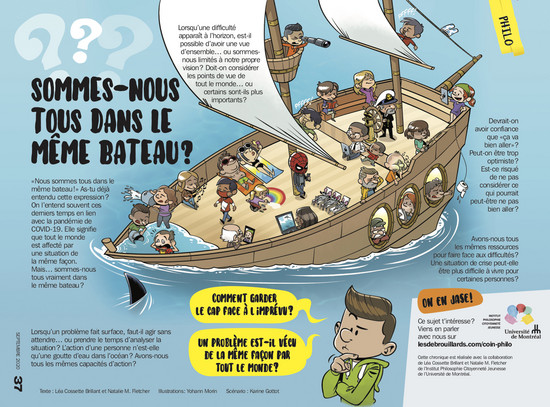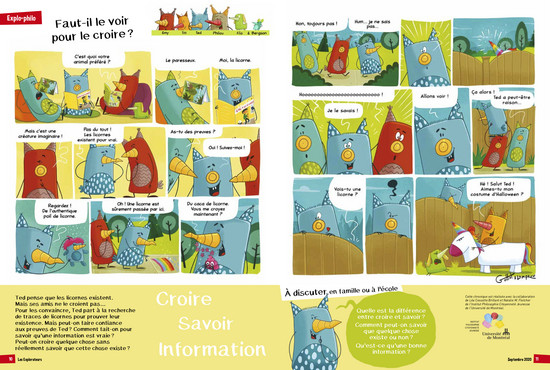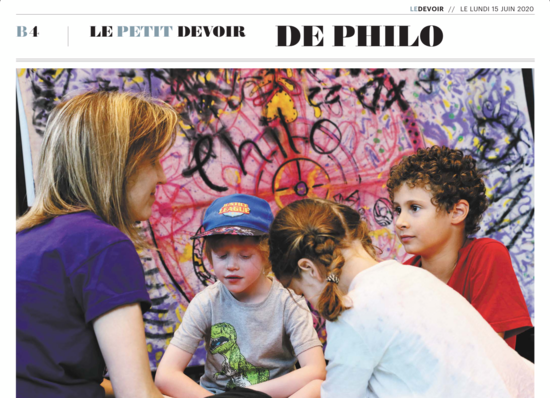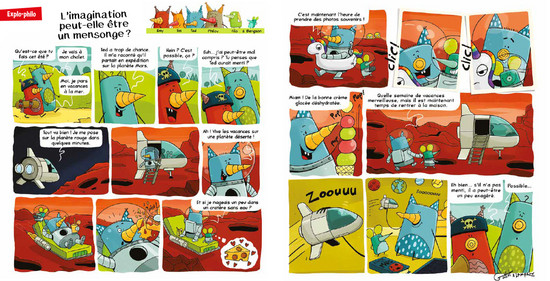Featured news
14.09.2020
The comic book Les Oizofilos featured among the selection of La Presse
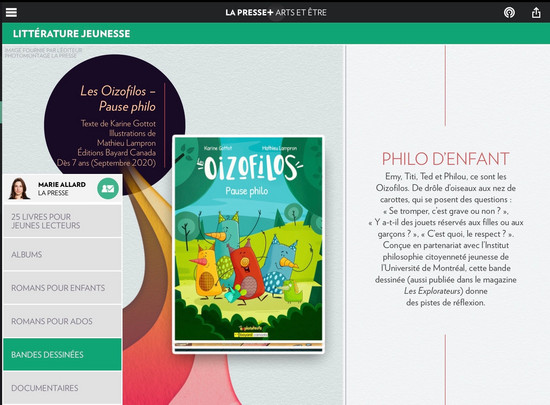
The comic book Les Oizofilos is featured among the selection of La Presse for the new literary season! These funny birds with carrot noses are asking a lot of questions: Is it bad to be wrong? Are there toys for girls and others for boys? What is respect? Conceived in partnership with the IPCY, the comic book offers amusing and intriguing thinking prompts for young philosophers from the age of 7! Available in libraries very soon!
01.09.2020
The philosophical column of the magazine Les Débrouillards
Click on the image to enlarge.
Are we all in the same boat? Do we all have the same resources to deal with difficulties? Can a crisis be more difficult for some people? Here are some of the questions proposed to the young readers of Les Débrouillards magazine this month. The IPCY is proud to collaborate with the magazine to create each month comics that encourage and support the reflection of young thinkers!
To discover all the comics : Le coin-philo des Débrouillards
01.09.2020
The philosophical column of the magazine Les Explorateurs
Click on the image to enlarge.
Ted thinks that unicorns exist, but his friends don't believe him. To convince them, he goes on a search to find unicorn tracks. Hmm... but how do you know that something exists or not? How can you evaluate an information? Can we believe something without really knowing that it exists? To ask yourself these questions and many more, follow the adventures of the Oizofilos in Les Explorateurs magazine. Created in collaboration with our team at the IPCY, the magazine offers monthly philosophical columns that stimulate the thinking of young people!
To discover all the comics : Le coin-philo des Explos
17.08.2020
In "Le petit Devoir de philo" this week, fake news
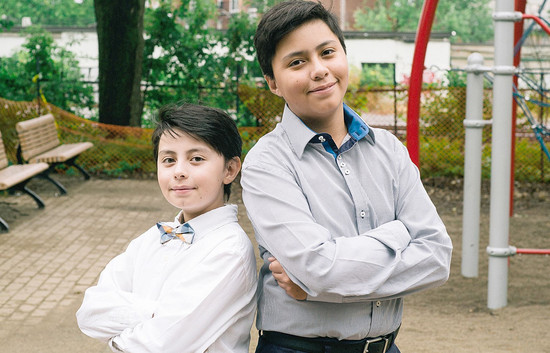
Should we punish fake news purveyors? In "Le petit Devoir de philo" this week, the Garcia brothers play the role of news anchors to reflect on the value of information. For Juan Miguel, 11, news publishers or broadcasters who share false information should "react immediately by informing the population that it was false, before there are serious consequences." According to him, there should even be "punishments for the media which duped the population," since they carry such great responsibilities! Indeed, they not only inform people, they also make people think and influence political leaders. But how do you know if a piece of news is true or false? For Manuel, 9, it is important to assess existing information sources: "We can go to another website and verify that it's the same answer." Explore their journey of reflection and creation in the intriguing world of PhiloQuests by reading the article and watching the video in Le Devoir!
To read the article: À la source du vrai et du faux
To watch the video: Le changement selon la famille Garcia
To launch into the PhiloQuests adventure: ipcj.umontreal.ca/philoquests
10.08.2020
In "Le petit Devoir de philo" this week, life and its regrets
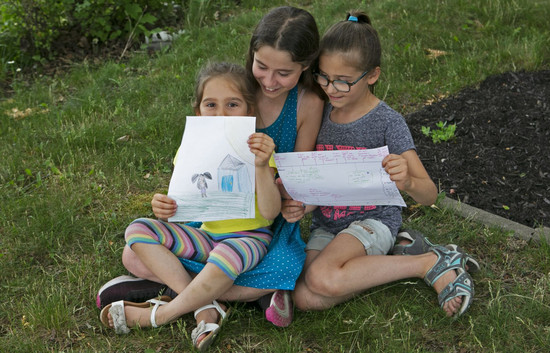
Would life be better without regret? In "Le petit Devoir de philo" this week, the Boudreault sisters explore the concept of loss by imagining a world where we could go back in time to change a life regret. The catch? We would lose everything that’s happened since! What would this world look like? To answer this question, Marion, 7, Constance, 9, and Saule, 12, created a character in this world and envisioned the timeline of their life. Breakup, death, unemployment… Do they want to erase these sad moments that they regret so much? The sisters hesitate: "If you don't have regret, maybe that means you're happier. You regret less things so you are not sad... If, for example, someone dies, you lose that person and you regret having lost them, you regret that they are no longer here with you…" But the sisters come to the conclusion that regrets should not be erased, because they teach us important lessons and can lead us to "beautiful things." Explore their journey of reflection and creation in the intriguing world of PhiloQuests by reading the article and watching the video in Le Devoir!
To read the article: La vie et ses regrets
To watch the video: La perte selon la famille Boudreault
To launch into the PhiloQuests adventure: ipcj.umontreal.ca/philoquests
07.08.2020
Discover the online Album of Philoquesters
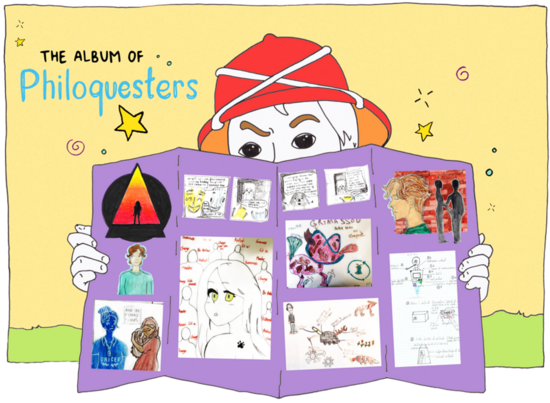
What happens when brilliant youth take on PhiloQuest missions? We get beautifully insightful and creative projects, like postcards telling the story of their adventures! Discover the philocreation work of young thinkers ranging in age from six to eighteen years old in the online Album of Philoquesters. From drawing and comics to poetry, stories and design, these projects reveal how philosophy can get us in touch with the concepts that matter to us most, through times of difficulty and moments of great solidarity. Happy discovery!
To explore the album: The Album of Philoquesters
03.08.2020
In "Le petit Devoir de philo" this week, optimism disappear!
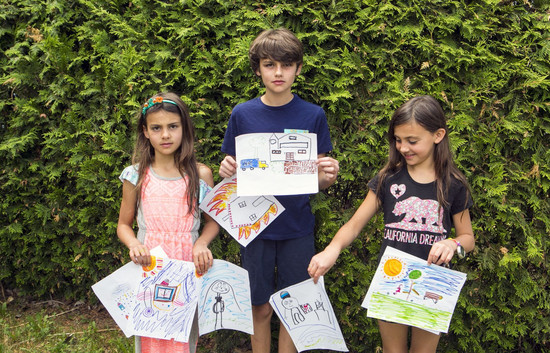
Should we always be optimistic? In "Le petit Devoir de philo" this week, the Séguin family imagines a world where optimism has gone missing! But who is optimism and what concept could be behind this kidnapping? In the world imagined by Adèle, 8, optimism is a little girl in a fuchsia dress who bounces with joy under a beaming sun, but behind a park bench hides worry, ready to take optimism away... For Marie Odile, 7, optimism "smiles all the time and is always happy," and has a pet rabbit that eats carrots. "But loss took the rabbit away, and its happiness disappeared," says Marie Odile. For her brother Léon, 10, if worry or loss can make optimism go away, it is possible to find it again. But beware! You shouldn’t always search for optimism, otherwise "you'd never know when to stop!" Explore their journey of reflection and creation in the intriguing world of PhiloQuests by reading the article and watching the video in Le Devoir!
To read the article: Nourrir l'espoir, ça s'apprend
To watch the video: L'espoir selon la famille Séguin
To launch into the PhiloQuests adventure: ipcj.umontreal.ca/philoquests
27.07.2020
In "Le petit Devoir de philo" this week, resilience is a treasure
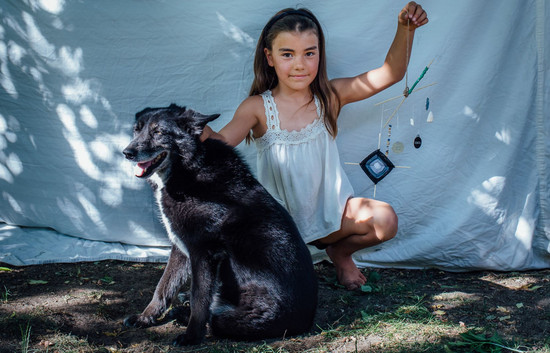
Is resilience a treasure? In "Le petit Devoir de philo" this week, Léonie Paradis-Pham, 9, reflects on the complex and fascinating concept of resilience by questioning the value of objects and people around her, as well as the hardships that marked their history. A broken wall, a scratched medal, a dismantled teddy bear… Should we try to hide the scars, the flaws or the traces left by our struggles? No, answers Léonie, because that would amount to "taking away a part of your story," she says. For her, being resilient isn't about denying sadness or hiding difficulties. “When you are resilient, you can still be sad about what happened. It doesn’t mean you find nothing difficult. It is to know that you’re in pain, but that's okay. Time will pass." Explore Léonie's journey of reflection and creation in the intriguing world of PhiloQuests by reading the article and watching the video in Le Devoir!
To read the article: Les trésors de Léonie
To watch the video: La résilience selon Léonie
To launch into the PhiloQuests adventure: ipcj.umontreal.ca/philoquests
22.07.2020
Workshops on the ethics of AI at the Prompt Techno Discovery Camp
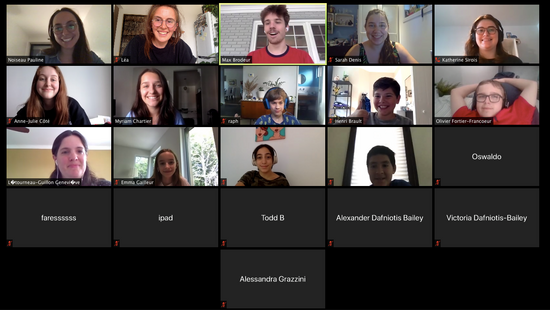
Could artificial intelligence replace teachers? Are all technological advances desirable? Should we create algorithms to delete fake news online? Young programmers aged 11 to 16 from the Prompt Techno Discovery Camp took a critical glance at the ethical dimension of artificial intelligence during two interactive workshops facilitated by our research assistant Léa Cossette Brillant. In partnership with the Technosocial Innovation Center Inven_T and the Agora Lab research laboratory of the University of Montréal, we created two workshops for the young technology enthusiasts to encourage them to consider the ethical impacts of technological advances. For them, while artificial intelligence can improve some of our experiences, it can also limit our horizons and even "influence us so much that we will no longer be ourselves!" Thank you for your thoughtful and impactful ideas!
20.07.2020
In "Le petit Devoir de philo" this week, the transformation of threats
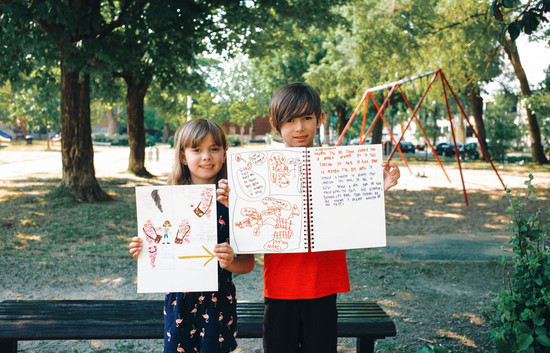
Can an enemy become a friend? In “Le petit Devoir de philo” this week, Augustin Cloutier-Rocheteau, 10, and his little sister, Ambre, 8, question the concept of worry by transforming dangerous threats into allies of humanity! A tornado that could destroy everything on its path turns into “a heart tornado, like a postman delivering love letters to everyone.” A terrible virus that is “sad because as soon as it wants to touch a heart, the person becomes sick” changes into a vitamin “to help people instead.” In the imagination of the young philosophers, these transformations inspire new questions: can you be mean, without meaning to be? Is it always possible to change who you are? Should all worries completely disappear? The brother and sister answer this last question in the negative... You have to worry to be able to protect yourself and try new things, and more importantly, "to be able to change the world!" Explore their journey of reflection and creation in the intriguing world of PhiloQuests by reading the article and watching the video in Le Devoir!
To read the article: Quand les menaces deviennent tout d'un coup gentilles
To watch the video: L'inquiétude selon la famille Cloutier-Rocheteau
To launch into the PhiloQuests adventure: ipcj.umontreal.ca/philoquests
13.07.2020
In "Le petit Devoir de philo" this week, help in question!
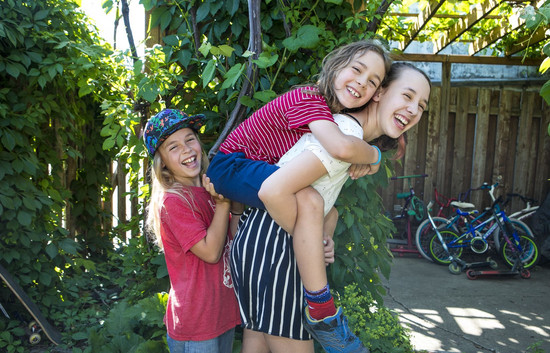
Is help always helpful? In "Le petit Devoir de philo" this week, the Delorme family plays with the concept of help by asking themselves big questions in a philocreation fashion. The brothers and sisters aged 7 to 15 wondered: Do you really need help in life? Can help be harmful? Does asking for help make you weak? For Baptiste, 10, helping each other is not only fun, it can also make us stronger. Like helping Aunt Jojo, who has cerebral palsy and could not be visited during the quarantine. "She needed a lot of people to talk to. So we called her twice a week. It makes her happier and it makes us stronger to help her. We talk to Jojo when our parents can't be there, and it's fun because we learn new things." For Gédéon, 7, if mutual aid is important, you should also know how to help yourself "by not cutting down trees, by not destroying the planet... and by not just eating hot dogs and fries!" Explore their journey of reflection and creation in the intriguing world of PhiloQuests by reading the article and watching the video in Le Devoir!
To read the article: L'entraide... ou l'envers d'un monde catastrophe
To watch the video: L'entraide selon les trois plus jeunes de la famille Cousineau
To launch into the PhiloQuests adventure: ipcj.umontreal.ca/philoquests
12.07.2020
PhiloQuests were presented at the international Sophia Online Meeting
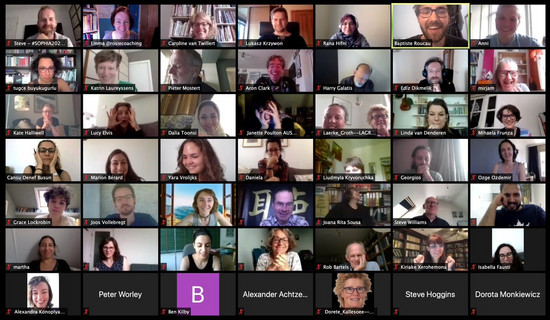
How can we engage youth in meaningful philosophical exchanges when isolation, anxiety and low bandwidth make traditional Community of Philosophical Inquiry dialogues difficult? PhiloQuests co-creator, Baptiste Roucau, presented our answer to this question during the 2020 SOPHIA - European Foundation for the Advancement of Doing Philosophy with Children Online Meeting about Philosophizing in Lockdown. The interactive workshop he facilitated not only introduced participants to PhiloQuests and philocreation, it also invited them to experience it themselves! The curious participants from all over the world enjoyed a playful and thoughtful exchange after sharing apprehension smirks and roars of courage to question the concepts of worry and resilience. Thanks to everyone present and to the organizers who created a inspiring event where we all felt connected despite the distance!
06.07.2020
In "Le petit Devoir de philo" this week, boredom is a game
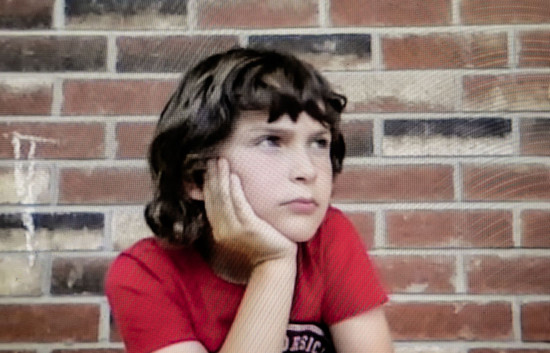
Can boredom spark creativity? In "Le petit Devoir de philo" this week, Léonard, 8, makes boring rhyme with amusing by conducting surprising interviews with ordinary objects. His Lego blocks told him they didn't like being taken apart, to stand on their own, away from their friends. In fact, "when they are built together, they are stronger," he reports. Questioning the doorbell, it confessed being particularly happy and fulfilled when it was complicit in the young boy's pranks! Explore Léonard’s journey of reflection and creation in the intriguing world of PhiloQuests by reading the article in Le Devoir!
To read the article: Entre l'étrange et l'ennui
To launch into the PhiloQuests adventure: ipcj.umontreal.ca/philoquests
01.07.2020
The Maison Théâtre youth theatre philosophical summer expeditions
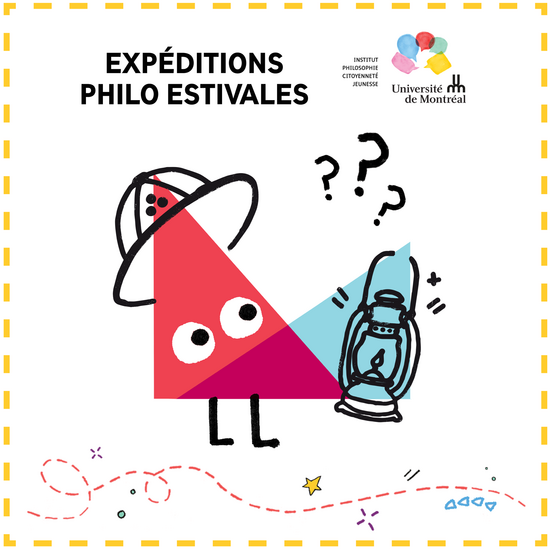
Do you miss theatre? Are you looking for inspiration for your creative projects? Do you like to wonder about art and the world around you? The Maison Théâtre youth theatre is offering mind boggling creative missions to take you on great philosophical and playful adventures in the wonderful world of theatre in the company of the Stion—a very curious little creature who loves to ask questions to enrich your reflections!
To embark on the philo expeditions: maisontheatre.com/activites-philo
29.06.2020
In "Le petit Devoir de philo" this week, solitude becomes a refuge
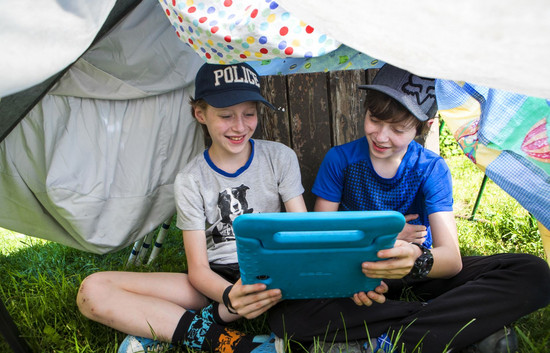
Is solitude a refuge? In "Le petit Devoir de philo" this week, the Roussel twins, 11, play with the concept of solitude by building a blanket fort. Once all settled in, they wondered: What is solitude? For the brothers who learned the meaning of "we" before "I," the answer to this question must take multiple detours. Indeed, it is important not to overlook the difference between being alone and being lonely and to understand that you can also be alone with others: it's what we call intimacy. You also have to consider different related concepts, such as creativity and safety. When you are alone, you can invent imaginary worlds in your mind to keep yourself company, but it is better to be with others to feel safe… Under the impulse of philocreation, the twins even invent an anti-loneliness hero to come to the aid of those who endure the negative sides of solitude. "Anyone can become an anti-loneliness hero," believe the twins. Even them. And you! Explore their journey of reflection and creation in the intriguing world of PhiloQuests by reading the article and watching the video in Le Devoir!
To read the article: Tout seul ou ensemble ?
To watch the video: La solitude selon les jumeaux Roussel
To launch into the PhiloQuests adventure: ipcj.umontreal.ca/philoquests
25.06.2020
Philosophy in a Pandemic: PhiloQuests featured in the The New York Times
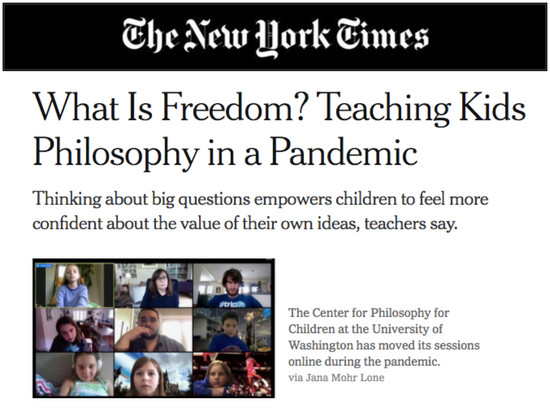
Do we have a responsibility to protect the health of others? What’s the difference between need and want? Could freedom come from not being free? Philosophy for children practitioners from all over the world are creating engaging opportunities for children to think together about the big questions that matter the most to them during these difficult times. We are so humbled to see PhiloQuests, our online platform, featured in The New York Times alongside other inspiring initiatives that support the wonderings of children in creative ways and empowers them to feel more confident about the value of their own ideas!
To read the article: What is Freedom? Teacher Kids Philosophy in a Pandemic
22.06.2020
In « Le petit Devoir de philo » this week, creativity comes alive!
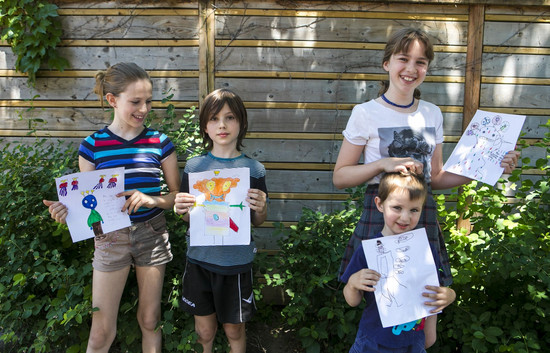
What if creativity was a living creature? In "Le petit Devoir de philo" this week, the Chalifour family questions the concept of creativity, thanks to a very special mission typical of the philocreation approach used at the IPCY — where concepts come alive! For Arnaud, 8, the character of creativity would have “a red cape, because creativity is a superpower!” For him, being creative is thinking about "new things. But not a single new thing... a whole lot of new things!” In the eyes of Florence, 8, young people are very imaginative and innovative. But as you get older, creativity becomes scarier... Just consider games to better understand this idea, adds Jeanne, 12. "We realized that games for children are games without rules, where you can do anything you want, while games for adults are more like board games, where you are told what to do." Explore their journey of reflection and creation in the wonderful world of PhiloQuests by reading the article and watching the video in Le Devoir!
To read the article: Le super pouvoir de multiplier les idées
To watch the video: La créativité selon la famille Chalifour
To "push your ideas to the limit" and "realize lots of things," to quote Jeanne, launch into the PhiloQuests adventure: ipcj.umontreal.ca/philoquests
19.06.2020
Our training in philosophical practices for youth
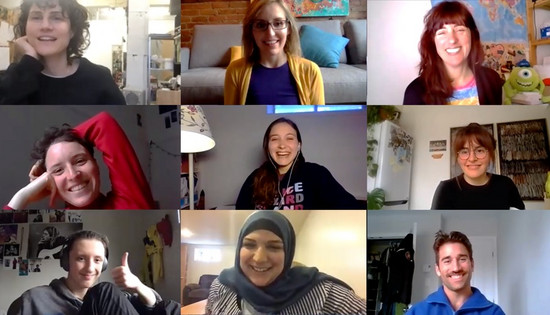
Can we learn the art of philosophical facilitation while in isolation? It’s almost like asking… is it possible to learn to swim without getting wet? A course on philosophical facilitation doesn’t exactly lend itself well to an online format! Although it doesn’t take much of a set-up to do collaborative philosophy, a circle of humans seated in close proximity, able to support and exchange with one another is quite necessary! That being said, philosophy for children and teens can adapt to its context—it is in its very nature! Complex situations that demand creative and thoughtful solutions only further enrich this approach and, in turn, redefine the role of philosophy in our societies. The team at the IPCY had the privilege to share this experience of adaptation and re-conception of practices with a group of students, whose commitment and care only motivated us to double our efforts in order to create training programs rich in meaning and nuanced reflections. Join us for the next cycle of training in philosophical practices for youth that will start this fall at Université de Montréal!
To learn more about our training: ipcj.umontreal.ca/training
15.06.2020
Le petit Devoir de philo : a series of articles inspired by PhiloQuests
What is a child’s thinking worth? A whole lot, replies Natalie M. Fletcher! "Young people are humans, they are not quasi-humans, or future humans, they are full-fledged humans and they have points of view, perspectives that we need for humanity." To make their very important ideas shine, the daily newspaper Le Devoir will be publishing a very special summer series of articles through which young people from across the province will be invited to participate in philocreation play, supported by our specialists! With that, "Le petit Devoir de philo" will be born, a weekly feature inspired by PhiloQuests! But before embarking on this philosophically creative journey, the first article of the series challenges you to reflect on the power of such an adventure... Wishing you an inspiring read!
To read the article: La valeur unique de la pensée de la jeunesse
01.06.2020
Comics that encourage and support thinking
Now that the nice weather has arrived, the Oizofilos of Les Explorateurs magazine share their plans for the summer holidays despite the uncertainty of the deconfinement. Blaise will enjoy the great outdoors at his cottage. Emy will play in the waves at the beach. But Ted will stay home... However, he tells his friends that he will explore a faraway planet! Did Ted lie? Hmm... can we lie without doing it on purpose? Can imagination be a lie? Can you venture into your imagination when you stay home? The IPCY is proud to collaborate with the brilliant teams of the magazines Les Explorateurs and Les Débrouillards to create comic strips every month that encourage and support the thinking of young philosophers!
To explore the comics:
Les Explorateurs: lesexplos.com/coin-philo
Les Débrouillards: lesdebrouillards.com/coin-philo
20.05.2020
PhiloQuests in the media
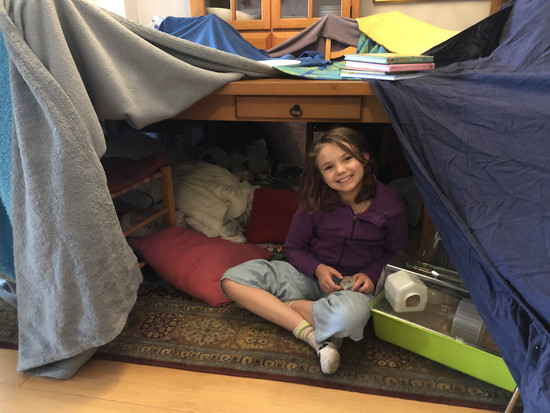
What if we introduced philosophy to youth in confinement? Could philosophy be an impetus for adventure? These are some of the questions addressed by the media reporting on PhiloQuests, the IPCY – Institute of Philosophy, Citizenship and Youth online platform featuring endless possibilities to experience ever exciting and enriching journeys of creative reflection through over a hundred free activities inspired by Brila’s philocreation. "Even if the deconfinement has indeed begun in Quebec, tourism and travel are not restarting any time soon. But who says we can’t go on adventures from the comfort of our homes?” writes Le Devoir. "It would be really beautiful if, amidst all this tragedy, we could learn to value young people’s thoughts and capacities to express themselves during very difficult times,” concludes La Presse.
To read the articles:
La Presse: Et si on initiait les enfants confinés à la philosophie ?
Le Devoir: Gestes de solidarité au quotidien
04.05.2020
Launching PhiloQuests... adventures in our mind !
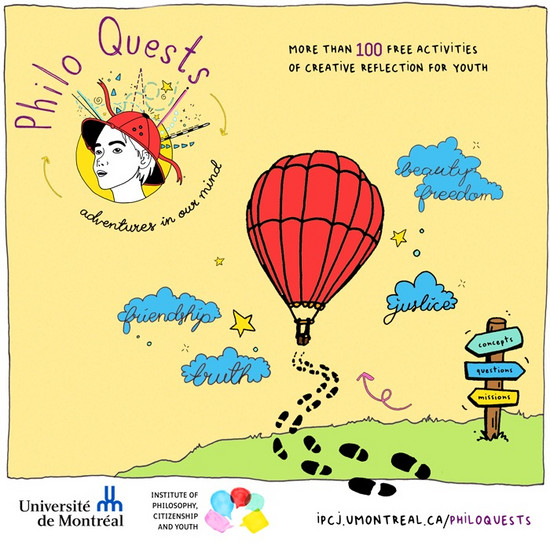
Looking for some brilliant fun to fill your days before school starts up again? Look no further! PhiloQuests are a series of over a hundred free thinking and creative missions, organized in days that are chock-full of all kinds of wonderings. From creativity and help to worry and resilience, they lead you to explore the concepts that are alive in your mind during this time of crisis. By becoming a Philoquester, you will embark on the adventure of asking yourself big questions to better understand the world, all the while playing with ideas... without leaving the comfort of your own home!
Why not ponder the value of solitude by making a refuge out of blankets? Or consider the implications of a world without worry by inventing a vacuum cleaner that sucks up all troubles? Unless, of course, you would rather interview strange objects to reveal the hidden side of normal? You’ll also find activities to do with your whole family and a guide for the adults in your life who would like to challenge themselves too. No experience required... just your imagination, lots of good reasons and basic arts and crafts materials.
The IPCY - Institute of Philosophy, Citizenship and Youth is very proud and happy to present this array of philosophical missions for youth of all ages, in collaboration with its community partners, including the magazines Les Débrouillards and Les Explorateurs, Radio-Canada, as well as Brila, which shared a significant part the program presented and inspired the creation of new activities thanks to its philocreation approach. We are so thankful for the creators Natalie M. Fletcher, Léa Cossette Brillant and Baptiste Roucau! Just because we're in isolation, it doesn't mean we can't have adventures in our mind... PhiloQuests, embark on the adventure!
06.04.2020
Curating a virtual space to dialogue together in isolation
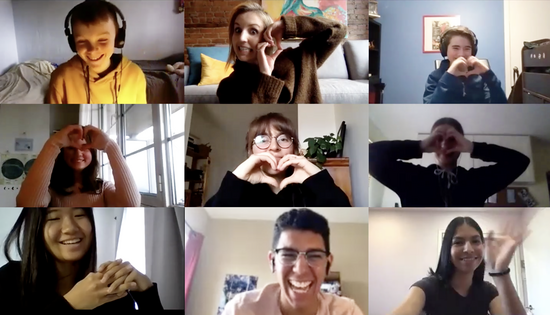
Does philosophical dialogue stop when we are isolated? Is it possible to share ideas in the absence of our dialoguing bodies? With a little creativity and the commitment of people who are eager to think together despite the distance, anything is possible! The situation we are currently experiencing provokes unique experiences and destabilizing questions. What is considered normal? Should we risk lives to have our freedom? Is friendship more important than security? Does benevolence justify control? Brila's young philosophers who formulated these questions, following the collaborative reading of a philosophical fiction related to the current crisis, chose to address that last question in a virtual but very real dialogue! According to them, to justify control we must have the knowledge to assess the situation according to different criteria, including the severity and proximity of the problem, but “it also depends on how much we care, for example global warming is very important for young people, but they don’t have the power to make decisions or take actions for the common good, while the coronavirus also affects older people in power.” During the dialogue, the co-inquirers challenged space-time to unite their perspectives and find possible answers to the questions that inhabit them. Thank you all for your brilliant and courageous ideas!
31.03.2020
The Ideation 2020 Conference is Postponed
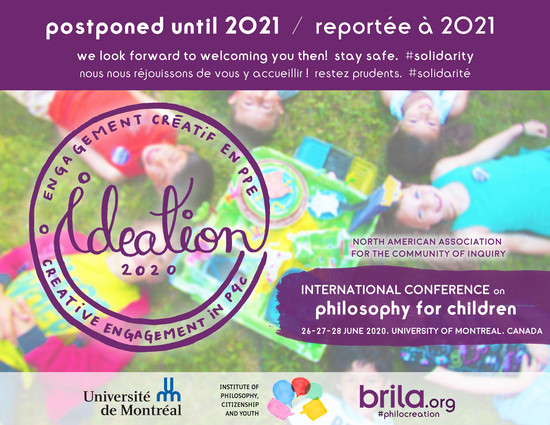
More than ever, the global pandemic reminds us of our interconnection and the importance of caring for each other. In the face of the unique situation we are experiencing, we must adapt in order to protect our local and international communities from the spread of the virus. It is with deep regret that we must announce that the conference "Ideation 2020: Creative Engagement in Philosophy for Children" and its related activities, as part of the biannual NAACI event, will not take place this June as planned and must be postponed until next year. We are very grateful for the commitment and contributions of everyone who participated in the conference presentation offerings and organization. We are very enthusiastic to continue working alongside you in a context that demands creative solutions that are both bold and thoughtful. Thank you for your resilience and your attention during this difficult and unprecedented period. Take good care of yourselves!
05.03.2020
Reform of the Ethics and Religious Culture Program
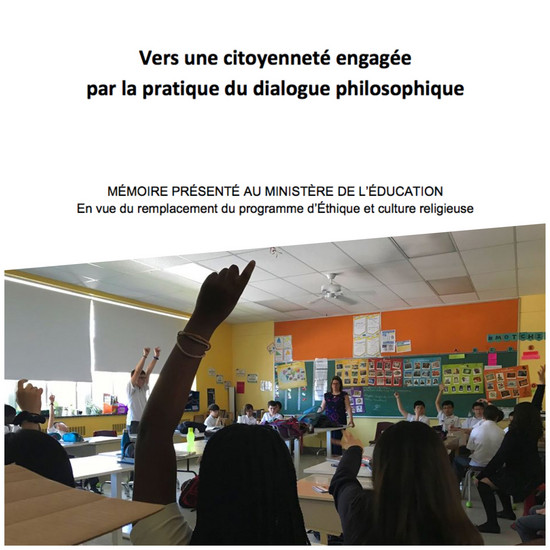
Following the announcement of the in-depth reform of the Ethics and Religious Culture program, the IPCY's Research Coordinator Natalie M. Fletcher joined a group of experts in philosophy for children and education to coauthor the dissertation "Towards an engaged citizenship through the practice of philosophical dialogue". For them, it is a perfect opportunity to rethink the formation of young people as emerging citizens. "We believe that the time has come to officially integrate philosophy for children and adolescents (PPEA) into the school curriculum of the Quebec student population." We can't wait to see what the next part is, as we will be meeting with the Ministry of Education very soon!
11.02.2020
The bursary program for the Brila philocreation camps
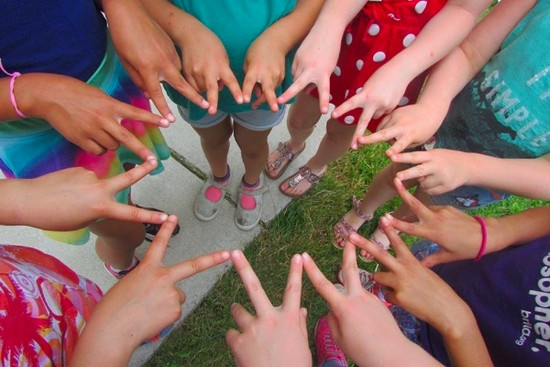
Brila's philocreation camps offer children reflexive and creative challenges that go off the beaten track ! We believe that no child should miss these imaginative overflows for financial reasons, and that is why we applaud the educational non-profit organization for offering bursaries to help families in need and ensure that a great diversity of participants can dialogue and create together. To benefit from the Brila bursary program, you can apply online following the link bellow. Bursary applications are assessed in the order they are received, so don’t wait to apply!
Bursary application: Online form
07.02.2020
Registration for the Brila philocreation camps is opening on February 7
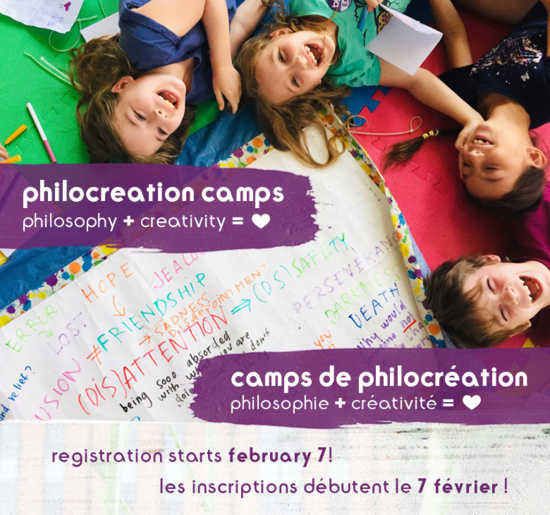
The IPCY is proud to support innovative and engaging projects which aim at the development of responsible citizenship among young people. Registration for the Brila philocreation camps is opening today, February 7! The camps are unique laboratories of imaginative thinking for curious and creative young people! Through multidimensional projects inspired by big questions that affect them the most, they collaborate with other young people who share their energy, their vision and their artistic talents, while helping each other to become leaders and models for their communities!
Registration: Brila Philocreation Camp
04.01.2020
Brila's young philosophers dialogue for the IPCY new training videos
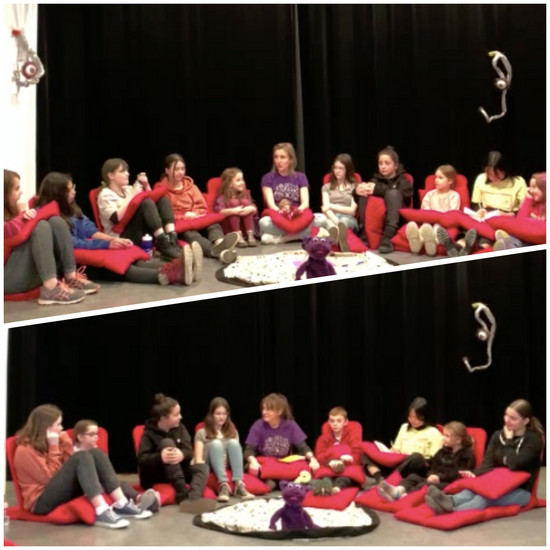
Do rules limit freedom? Does knowledge make you happy? Brila’s young philosophers dialogued in front of the cameras about questions raised by students at the University of Montreal. Doing so, they participated in the preparation of videos for the new training in philosophical facilitation of the IPCY. The best way to learn to facilitate is to be inspired by children who have been philosophizing for a long time!
17.12.2019
Series of interviews about the podcast "Les jeunes sages"
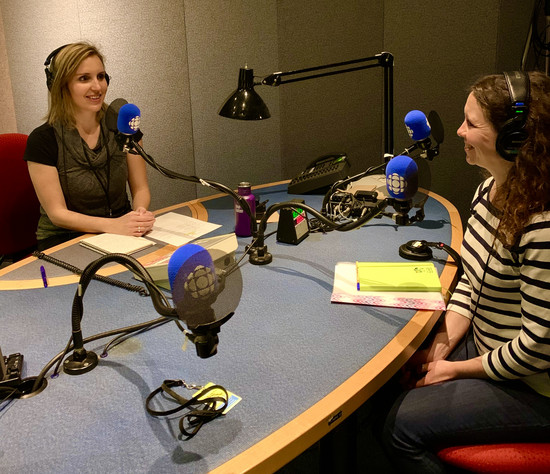
What if a podcast could challenge our conception of childhood? The vivacity of mind of Brila's young philosophers provokes adults' perceptions: "it is the kind of project that reminds us how much children and teens are full of wisdom", "young people who are very idealistic, who have more courage in their convictions than adults, and yet who are so humble". Director Geneviève Brault and philosopher Natalie M. Fletcher of the IPCY discuss with different radio contributors about the podcast "Les jeunes sages" in this series of interviews. All episodes of the first season of the podcast are now available online on Radio-Canada website and apps—how to nourish your minds and not just your bellies during the holiday season! "Listening to young people thinking about important society issues, it's delicious!"
10.12.2019
The IPCY supports the philosophical training of the teachers at Ecolint
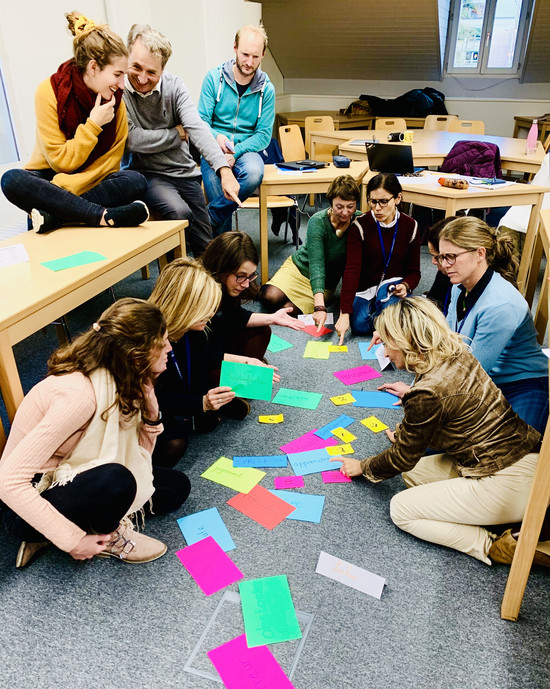
Can we change our identity? Can we tell a story to ourselves? How do we construct our character? What does it mean to be good at something? Brila in partnership with the IPCY led intermediate to advanced trainings at the International School of Geneva with teachers from preschool through secondary school. During the trainings focused on philosophical quality, we had the chance to facilitate amazing exchanges with devoted and inspired teachers who are committed to helping youth become autonomous thinkers. It is such an honour to transform the long-term relationship between Brila and the Ecolint into one of the IPCY’s international partnerships, offering support in professional training in philosophical facilitation and initiating longitudinal studies on the effects of Philosophy for Children. We are so excited to see you again in the winter!
24.11.2019
The IPCY at the International Forum on New Philosophical Practices
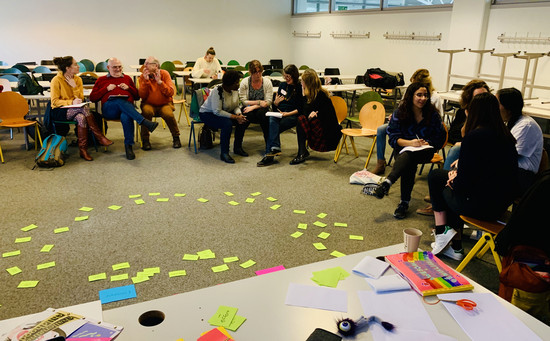
The IPCY is creating new international connections, participating with Brila in the International Forum on New Philosophical Practices in Geneva, co-organized by the UNESCO Chair of "Philosophy with Children Practices" and the association ProPhilo. A very warm thank you to Edwige Chirouter for the invitation and the time allotted to our workshop, during which we presented #philocreation through an immersive experience of philosophical games, inventive dialogues and creative missions. It was a real pleasure to meet new people and to reconnect with our esteemed colleagues, whom we are looking forward to hosting at our international conference Ideation next year!
18.11.2019
The intensive and immersive course in Philosophy for Children
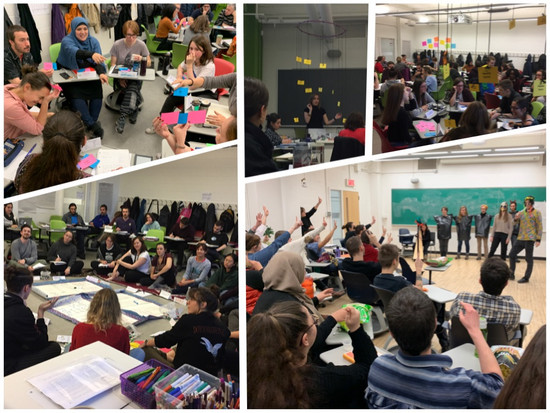
What does it mean to be yourself? What is the value of silence? Is it possible to waste time? Can we devote ourselves to what we hate? It is around these questions, and many more, that a wonderful community of philosophical inquiry was formed during two intensive weekends bringing together a beautiful diversity of humans, with varied backgrounds and experiences. Dialoguing together, they familiarized themselves with the various techniques of Philosophy for Children (P4C), questioning phenomenological experiences, social justice, education, childhood, creative expression... This new intensive and immersive formula of the course “PHI 2450 Principles and Methods in Philosophy for Children” led them to discover the principles and practices of the classical dialogic pedagogy in P4C, to then venture into new innovative approaches, including Brila's philocreation—the participants had the chance to philosophize with young philosophers of the educational charity, in addition to creating their very own philozine and plays! Thank you all for playing the game of P4C!
6.11.2019
A podcast featuring young philosophers
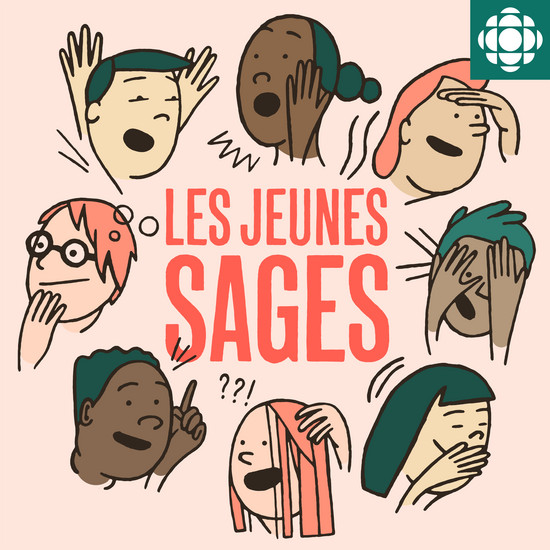
Are we responsible for nature? Can everything be said? Is it effective to punish in the name of learning? Can competition be positive for relationships? These are some of the questions you will navigate listening of the podcast "Les jeunes sages". Each episode offers a lively and engaging encounter with Brila's philosophers interacting with a Québec personality, including First Nations activist and co-founder of Idle No More Quebec Melissa Mollen Dupuis, singer-songwriter Safia Nolin, actress Guylaine Tremblay and speed skater Marianne St-Gelais. Together, they prove that philosophy is not a question of age! A new episode is published every Wednesday on the Radio-Canada website and the Radio-Canada app OHdio. Happy listening!
07.10.2019
A second course in Philosophy for Children at UdeM
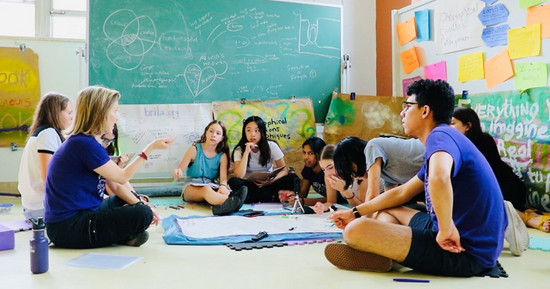
How to support the emergence of responsible citizenship in young people? What are the challenges of new philosophical practices involving young people? What is the role of the adult in the community of philosophical inquiry? Following the success of the two first editions of the introductory course PHI 2450 – Principles and methods in Philosophy for Children (P4C), during which students create their own community of philosophical inquiry to explore the philosophical as well as pedagogical developments of this eclectic movement, the IPCY is pleased to announce a second P4C course that will focus on the art of facilitation! The course PHI3450 - Philosophical Facilitation for Youth will take the form of intensive training workshops and supervised practices in philosophical facilitation. Students will familiarise themselves with the dispositions necessary to the animation of collaborative dialogues inspired by the authentic questioning of children and adolescents, in order to promote the use of the thinking tools and encourage the development of reflective dispositions, as well as to plan and put into practice philosophical workshops inspired by the traditional P4C curriculum and emerging dialogical practices!
01.10.2019
Launching the call for proposals for the 2020 Ideation Conference
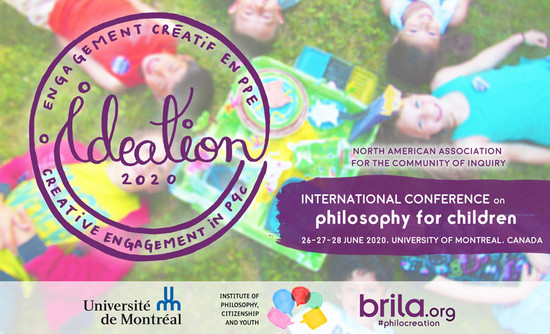
The IPCY and Brila are happy to launch a the call for proposals for the North American Association for the Community of Inquiry (NAACI) 2020 Conference ! The international conference “Ideation: Creative engagement in philosophy for children” (P4C) aims to immerse participants in a vibrant atmosphere of co-creation around questions pertaining to the place of creativity in philosophical inquiry with young people and the adults by their side. The conference that will take place in Montréal June 26-27-28, 2020 seeks to be diverse and inclusive, and thus encourages submissions from a wide variety of sources and backgrounds. Researchers, practitioners, educators, teachers, students and youth workers involved in P4C practices are invited to submit proposals for research, workshop or poster presentations addressing topics of creativity, creative thinking, creative agency or creative problem-solving in varied contexts, such as innovative classroom and extra-curricular models, community-driven citizenship and social justice initiatives, art and culture practices, social entrepreneurship and sustainable businesses. The deadline for proposal submissions is December 9, 2019. Looking forward to hearing from you!
27.09.2019
The IPCY strike for climate with young philosophers
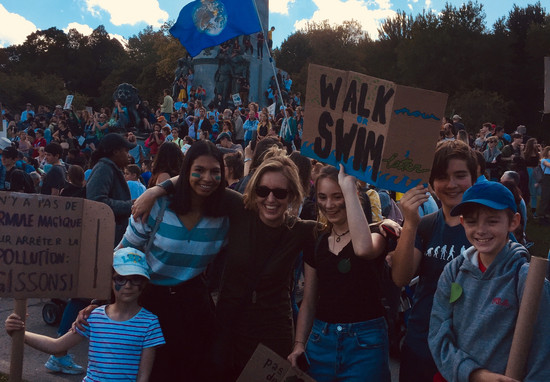
What is activism? Can a single person change the world? What does responsible citizenship imply? The IPCY had the honour of walking alongside Brila’s young philosophers aged 7 to 17 who participated in the recording of a podcast during the Montreal Climate Strike on September 27th. They joined hundreds of thousands of protesters marching their placards, demanding government action to combat climate change. Dialoguing together, they shared their questions, impressions and positions on this collective movement inquiring about young people's power of action, inspired by the youth-led mobilization initiated by young environmental activist Greta Thunberg.
17.09.2019
A plea for philosophy from elementary school
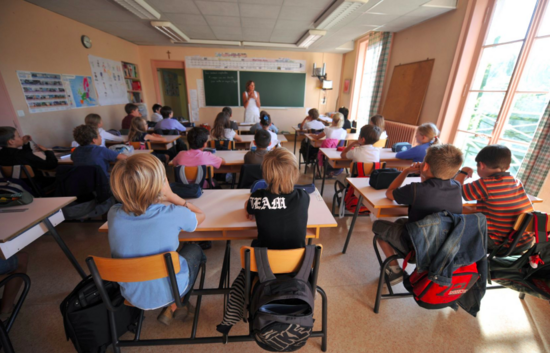
Why not start practicing philosophy in elementary school? While the Quebec Minister of Education plans to revise the Ethics and Religious Culture (ERC) program, Mathieu Gagnon and Michel Sasseville propose to integrate philosophy as part of the curriculum, supported by numerous professors, teachers, authors, philosophers, theoreticians and practitioners in Philosophy for Children (P4C) including Dr. Natalie M. Fletcher. In the article published in Le Devoir they write: "For almost 40 years, Quebec has been considered a leader in the field of P4C. So, why not take advantage of the expertise developed here for many years to rethink the ERC program, position Quebec on the international scene and even make a clear statement about our conception of students as open-minded citizens, respectful of differences, capable of self-determination and able to think for and by themselves with others?"
16.08.2019
Concepts come to life at Brila's philocreation camp
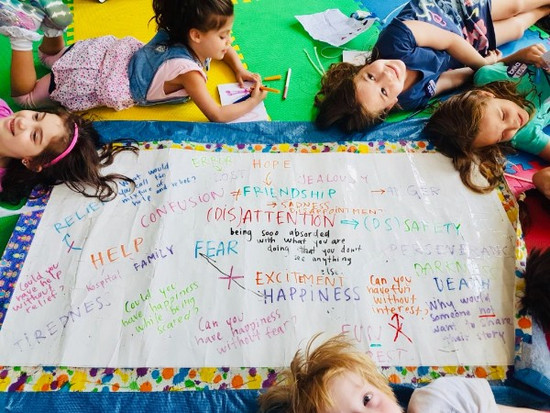
The IPCY is proud to support Brila’s philocreation camp! “Do we understand our lives better with concepts?” This summer, a group of brilliant young philosophers aged 5 through 12 immersed themselves in ten days of reflexive and creative outbursts during the camp! Partnering with the amazing Maison Théâtre youth theatre they explored the many facets of living art through their very own conceptual playground, creating and playing with conceptual creatures that led them to recognize the nuances and ambiguities hidden in concepts and understand their importance in our world. Working alongside creative experts who gave them new tools and perspectives for their collective project-making, they brought concepts to life in a great conceptual masquerade! “It’s like taking our thoughts and giving them colour and personality. We often have these ideas, but they can be very vague and something that can disappear off the top of our head! When we make them characters, it makes it more real and takes the ideas in our head and gives them life!”
26.07.2019
The IPCY and Brila participated in the Biennial International ICPIC Conference
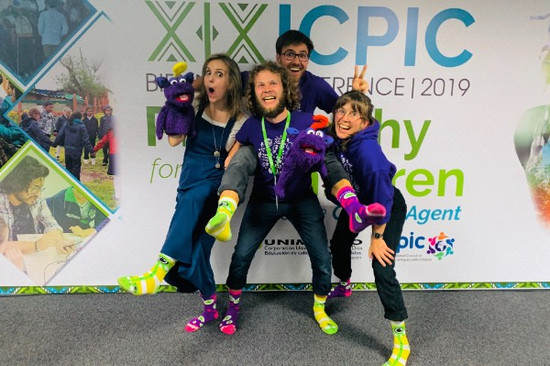
The IPCY travelled to the 19th edition of the ICPIC – International Council of Philosophical Inquiry with Children alongside Brila! The event hosted by Corporación Universitaria Minuto de Dios in Bogotà brought together theorists and practitioners engaged in philosophy for and with children (P4wC) to examine the P4wC program in relation to the ideal of the citizen-agent offering a unique opportunity for dialogue and idea sharing with remarkable individuals and organizations engaging young people in philosophical inquiry all around the world!
19.07.2019
Philocreation workshop for teens
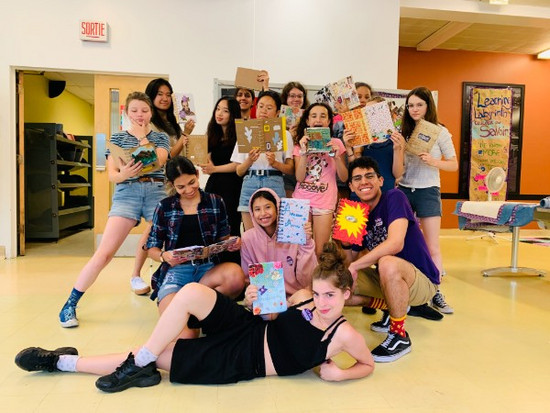
What is it to live life to the fullest? Is life better with a grain of negativity? What is femininity? Do relationships eat away your identity? Do your origins chase you wherever you go? These are just some of the mind-boggling questions that captured a group of teenagers who invested the University of Montreal campus and immersed themselves in two weeks of philocreation, building an emergent curriculum, thinking and creating together toward the co-construction of a philosophical novel. They learned the fine art of bookbinding to create philozines able to carry their generative questions and courageous positions. They worked alongside creative experts who sparked new perspectives and art forms to enrich their collective storytelling. They constructed metaphors to enlighten complex experiences and transposed the scenes from their imagination. They wondered about the concepts that lurk in the shadows and hiked under the sun to enflame their inspiration. They wrote manifestos of adolescence and unschooling curriculums. They created a whole universe for a novel, impacting along the way our own world with their bold and thoughtful ideas!
01.07.2019
Ideation : Creative engagement in philosophy for children

How might creative experiences enable, deepen and motivate Community of Inquiry (COI) dialogues? Are aesthetic, embodied, affective experiences important in a philosophical dialogue? Could creativity harm or hinder a philosophical practice? We are very proud to announce that Brila and the IPCY will be co-hosting the North American Association for the Community of Inquiry (NAACI) 2020 Conference! The international conference “Ideation: Creative engagement in philosophy for children” (P4C) aims to immerse participants in a vibrant atmosphere of co-creation around questions pertaining to the place of creativity in philosophical inquiry with young people and the adults by their side. In response to a world context with increasing demands for creative solutions that are both bold and thoughtful, this bilingual event will deepen our collective thinking around theoretical, empirical and practice-based approaches in P4C! In addition to offering a selection of research presentations—including individual, panel, workshop and poster sessions—and opportunities for COI dialogues, the conference itself will model various types of creative agency with participants of all ages to provoke and push our collective wondering around these important themes. The conference will be preceded by a three-day pre-conference philocreation workshop as well as a one-day tourist adventure in wonderful Montreal. This creative outburst will take place at the University of Montreal June 22-28, 2020—save the dates!
15.06.2019
Brila's young philosophers reflect on the power of philosophy
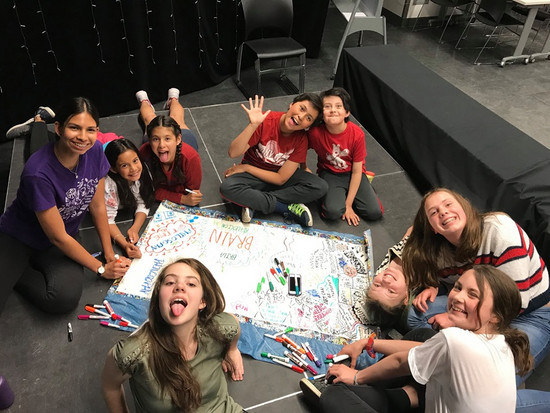
Once again, the IPCY welcomed to the University of Montreal campus the youth board of Brila. The young philosophers participated in an afternoon of dialogues and creative projects trying to make sense of what philosophy really is, and along the way deconstructing and redefining conceptions of both childhood and philosophy. During the workshop, the young thinkers shared their own experiences and thoughts about philosophical practice in an interview for a book that will soon be published. The editors wanted to include their very special perspectives because they are so unique—for some having spent more than half of their lives doing philosophy! Surely, the interviews turned into passionate dialogues about the importance of a regular philosophical practice, the right of children to be taken seriously, the limitations of the current school system and the transformative power of philosophy!
06.06.2019
Destabilizing stereotyped concepts in childhood
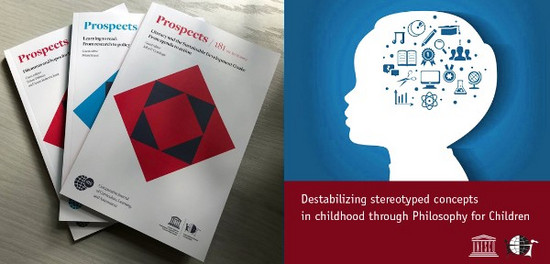
Can Philosophy for Children aid prevention of violent extremism? "Education aimed at violence prevention tends to affirm that thoughtless generalizations—especially prejudiced and discriminatory ones—about individuals and groups can lead to extremist thinking and harmful action. Yet, can the same be said of the stereotyping of concepts?" In her article Destabilizing stereotyped concepts in childhood: Some opportunities and risks of philosophy for children as an aid to PVE published in the latest issue of Prospects—a journal edited by UNESCO’s International Bureau of Education—Dr. Natalie M. Fletcher explores how the stereotyping of concepts risks interfering with children’s reasoning, resulting in epistemic rigidity and reduced opportunities to practice responsible autonomy, and offers promising avenues for P4C "with an aim to cultivate flexible thinking in children and thereby support their evolving competence as emerging agents”!
28.05.2019
The IPCY and Brila at the International School of Geneva
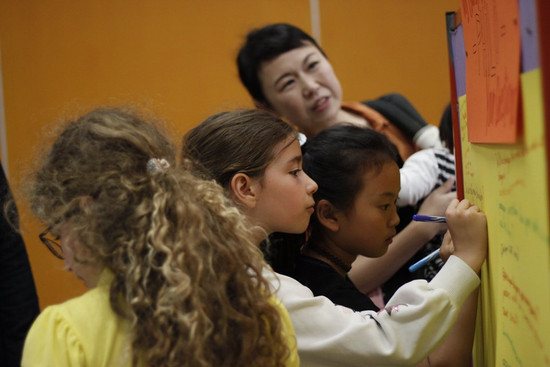
The year four classes at International School of Geneva participated in BrilaGlobo bilingual philocreation programming, supported by the IPCY, during which concepts even spilled out of school walls to be invited over for dinner with the family! The young philosophers participated in engaging philosophical dialogues and thoughtful creative projects, culminating in a great exhibition during which they were able to share their important ideas with their families and friends. The IPCY also provided training and coaching to the teachers of the primary, middle and secondary schools committed to integrate the community of philosophical inquiry into its pedagogical practices!
07.05.2019
The introductory course in Philosophy for Children offered again in the fall
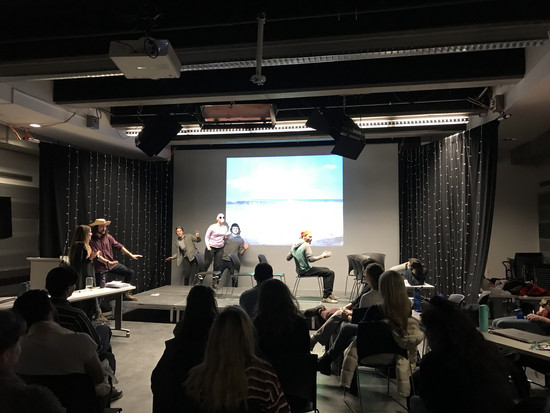
Do we stop being a child? Does knowledge make us happy? Can we rely on emotion to justify rules? Throughout the sessions, the students of the PHI 2450 – Principles and methods in Philosophy for Children course were able to explore the foundations of the eclectic movement and follow its multiple evolutions by questioning reasoned argumentation, phenomenological experience, ethics, social justice, affective education, aesthetics, creative expression… Every class the group embarked on a collaborative philosophical inquiry following the different styles of P4C in order to cultivate multidimensional thinking and thus be able to take a critical, creative and attentive glance at the different themes of the course. We are very happy to announce that the course will be offered again in the fall!
26.04.2019
How to raise youth's awareness of socio-scientific controversies ?

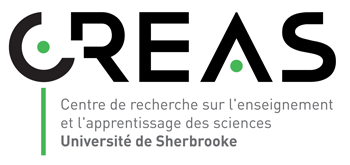
The IPCY participated in the event “Multiple perspectives on education for socio-scientific controversies,” organized by the CIRST - Centre for Interuniversity Research on Science and Technology and the CREAS - Centre for Research on Teaching and Learning in the Sciences. In collaboration with the Montreal Science Centre, the IPCY modelled an example of teaching socio-scientific controversies with an aim to foster critical thinking and argument co-construction with adolescents through innovative collaborative dialogues.
18.04.2019
Why discuss difficult issues with youth ?

The IPCY participated in the Philosophy for Children (P4C) symposium of the Committee for Precollege Instruction in Philosophy at the American Philosophical Association conference in Vancouver. The symposium united international theorists and practitioners of P4C in order to promote collaborative thinking in the field. The IPCY’s presentation focused on the challenges of discussing difficult issues with youth—how to identify suitable times and how to successfully facilitate.
30.03.2019
Young philosophers on UdeM's campus
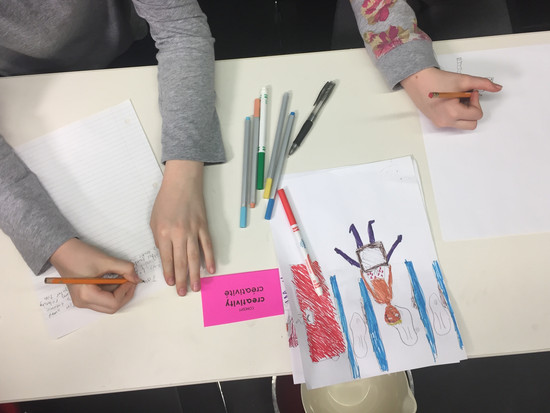
The IPCY welcomed to the University of Montreal campus the youth board of Brila Youth Projects, an educational charity that fosters metacognitive thinking and creativity in youth through philosophical dialogues and creative projects. These young philosophers playfully engaged with the key concepts of philosophy and discussed questions explored by students of the PHI 2450 – Principles and methods in Philosophy for Children course, demonstrating that philosophy is suitable for people of all ages!
08.01.2019
The first course in Philosophy for Children at UdeM
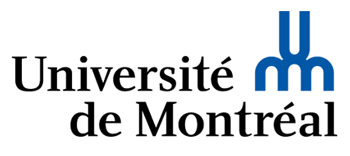
The IPCY is pleased to announce the first course in Philosophy for Children (P4C) at the University of Montréal. The course PHI 2450 – Principles and methods in Philosophy for Children explores both the philosophical and pedagogical developments of P4C by analyzing its foundations—its history, principles and pedagogical methods—and by giving students the opportunity to experience this practice together through the Community of Philosophical Inquiry (CPI) method.
